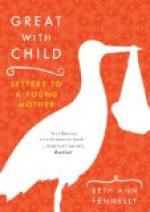I know there is an almost universal prejudice against this sort of bread. Some complain that it scratches their throats; others, that it is tasteless; and others still, that it does not agree with them. With others there is another objection—which is that bread of this sort has sometimes been called dyspepsia bread; and with others still, that it has been called Graham bread. Either of these appellations seems sufficient to condemn it.
Now as to the harshness, this is owing to its being made of bad materials, or to its being baked too hard, or kept too long. Much of what they call dyspepsia bread, in our cities, is evidently made by mixing the bran and flour of wheat after they have been once separated; besides which, in not a few cases, the finest of the flour appears to be taken away. Now bread made of such materials thus combined, will always be darker colored, as well as harsher, than when made from the wheat, simply ground without any bolting, and wet up in the usual manner. Such bread is best two or three days old. After four days, it becomes dry and somewhat harsh.
They who complain that such bread is insipid, are persons whose appetites have been injured by food which is high-seasoned; and who, if they eat bread at all, must eat it hot, or soaked in butter. No wonder such persons do not like plain bread, and say it is tasteless. But it must not be denied that bakers often suffer this kind of bread to be over-risen, in order to make it sufficiently light and porous. This renders it less tasteful, and from the saleratus they use, less wholesome.
No child who has been accustomed, from the first, to good wheaten bread, made of unbolted meal, and not less than one day old, will ever prefer any other, until he has been rendered capricious on this subject, and wishes to change for the sake of changing, or until he has been misled by surrounding example. I speak from observation when I say that infants, whose habits have not been depraved, will not prefer hot bread of any kind. “It is hot, mother,” I have heard them say, as an apology for refusing a piece of bread; but never, “It is cold,” or “It is too old.”
It is the epicurean—it is he with whom it is a sufficient objection to any kind of food whatever, that he has used it for several successive meals or days—that is most ready to complain of good bread. He whose habits are correct, and who is the more unwilling to change any of his articles of diet, the longer he has been in the use of them, and who only changes them, or uses variety, from principle—he, I say, will never complain of harshness or want of taste in good wheat bread; nor will it be an objection of weight with him that Mr. Graham has recommended it, or that it has either prevented or cured dyspepsia.
Nor will the epicurean himself complain that bread is insipid, after being confined to it for a month or six weeks. He will then find a sweetness in it, for which he had long sought in vain in the more delicate and costly viands of a luxurious, and expensive, and unchristian modern table.




